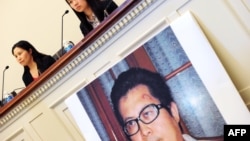The sister of a prominent imprisoned Chinese political activist said Friday she fears her brother is seriously ill and is urging the authorities to allow him access to better medical treatment, in what an international rights group said is the latest example of China routinely denying political prisoners adequate care.
Yang Maoping said her brother, Yang Maodong, looked pale and emaciated during a visit on April 26 and complained of having had blood in his stool for the past year.
Yang Maodong, 49, better known by his penname Guo Feixiong, is serving a six-year sentence in a southern Chinese prison after years of pushing for constitutional rule, media freedom and democracy in China. Before his 2013 detention, Yang was in good health, his sister said.
"Now, his condition looks extremely terrible, extremely terrible,'' she said.
Yang said prison authorities had yet to respond to her request that her brother receive a thorough medical exam.
"I have been calling the prison office every day, hoping there is still a glimmer of humanity,'' she wrote in an online post. "But there's been not a single response over this life-and-death matter.''
Zhang Lei, a lawyer for Yang Maodong, said he was only given two minutes to visit Yang in prison on Friday. Though he was unable to thoroughly assess Yang's health or inquire about his condition, the prisoner did not appear to be well, Zhang said, adding that he submitted a request for Yang to be accompanied by a family member to a major hospital for a checkup.
The prison declined to answer questions about Yang's health condition, citing privacy reasons.
Supporters of Yang have started a relay hunger strike to call attention to his deteriorating health and lack of health care.
New York-based Human Rights Watch said Yang's case illustrates China's dismal record on providing medical treatment to political prisoners. It called the denial of care a violation of the United Nations Convention Against Torture, to which China is a party.
"It's bad enough that China sends peaceful activists and journalists to prison for years,'' Sophie Richardson, the group's China director, said in an emailed statement. ``But to deprive them of medical care even to the point of allowing their death is the ultimate in inhumane treatment.''
In a separate case, Gao Yu, a Chinese journalist released on medical parole after being imprisoned on a state secrets charge, has been denied medical insurance and, with no income, is struggling to pay for medical treatment, Human Rights Watch said.
"Chinese officials are earning an ugly reputation over their willingness to let political prisoners get terribly sick _ and even die _ in detention,'' Richardson said. ``The only appropriate response is for authorities to immediately facilitate access to adequate medical care for Guo Feixiong and Gao Yu, and all others who need it.''




